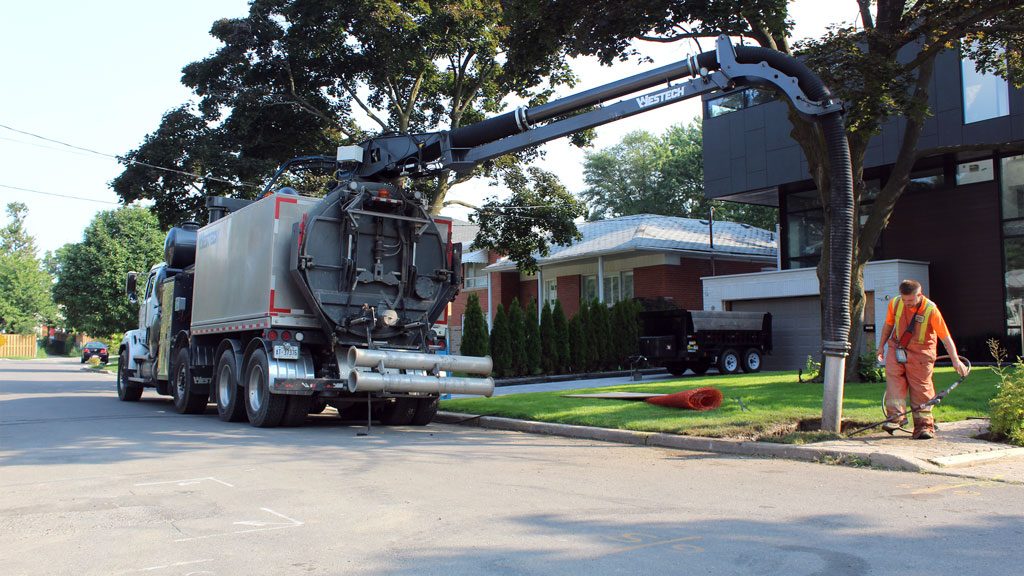The Westech Wolf is a hydrovac truck designed “Alberta tough” by Westech Vac Systems, based out of Nisku, Alta.
The company has been serving Alberta’s oilfields for more than three decades with full-sized hydrovac trucks that are designed for the harshest environments.
“For the Westech Wolf design, our primary focus was to provide a cost-effective hydrovac, while also maximizing legal payload and productivity,” said Westech general manager Ben Schmitt. “Our customers are struggling more each day with weight compliance and are looking for a vacuum excavator to maximize payload while also performing the jobs in the same or less amount of time than before with their current vacuum excavation equipment.”
Schmitt continues: “Our customers in northern Alberta work in some of the worst conditions imaginable with temperatures reaching 40 below and colder. Our customers need equipment that can operate in these conditions 24 hours a day without stopping.”
ReadyVac is a family-owned and -operated 10-truck hydro excavation company that provides excavation, directional drilling and hard surface coring.
“We are a small company with no plans of becoming a big company; we imagine growing to a maximum of 12 vacuum trucks and three drills,” said Alex Samson, an operations manager with ReadyVac.
The company serves mainly the Greater Toronto and Barrie areas in southern Ontario.
The company increased its fleet size last year when it purchased its first two Westech Wolf hydrovac trucks from Joe Johnson Equipment, the division of Federal Signal that handles sales, parts and service for Canada. This year, at Truck World in Toronto, they purchased another one.
“We plan on converting our whole fleet to Westech,” said Samson.
The company was looking for a purpose-built, durable truck that can tackle the big jobs, stay on the job longer and increase productivity.
“What I like about the Westech Wolf truck is its simplicity,” continued Samson. “They are a very operator-friendly machine to use and engineered well. I can see a lot of thought was put into deciding where items should be on the truck and how its design affects the operators using them and mechanics working on them. I chose this machine because it was one of the first SPIF (Safe Productive Infrastructure Friendly) compliant trucks that was engineered to maximize legal payload with large debris capacity. Other trucks with this capability had very small tanks and small vacuum blowers, which is not ideal for our operations.”
ReadyVac projects include maintenance pits for Bell, turnkey projects from start to finish bringing the fibre to the homes, posthole work, and emergency calls for faults in the installation of new Bell fibre optics.
“Customers often request the Westech Wolves on their site over some of our older trucks because they know the capacity and productivity,” said Samson. “We used it recently to complete locating services for a telecommunications company. Locating the services is essential because it allows the drill to do its work without hitting the service.”
The Westech Wolf has two distinct advantages, the company stated.
It offers a high payload capacity and great balance due to the truck’s tank design. With the Wolf hydrovac, the debris body is positioned on the optimal spot of the chassis to ensure the payload is proportionately distributed across all axles simultaneously, unlike other hydro excavators that feature uni-body designs with sloped floors where weight shifts as water is used and debris is loaded, which often results in lost payload capacity.
“We designed the Westech Wolf to position the debris body and water tank centre line of gravities into the same location on the chassis,” said Schmitt. “We accomplished this by utilizing our side mounted, aluminum water tank design. Maintaining the centre of gravities of the debris and water tank allows us to position the variable weight on the chassis in a position where it loads the axles equally, so they reach maximum capacity at the same time.
“Many trucks are designed so that the weight shifts throughout the chassis from front axle to rear axle group as material is vacuumed up and water is consumed. The result is you’re never able to maximize weights on the chassis axles.”



Way to go, Alex. will continue to monitor your success. Grandma.